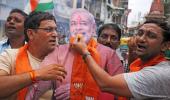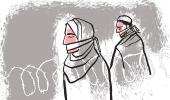The Kashmir Press Club has denounced the communication gag in the valley and called for resumption of the services as the clampdown continued for the 51st day on Tuesday.

Officials said the authorities would take a call at an appropriate time on the resumption of the mobile and Internet services, which remained suspended in most parts of the valley since last month when the Centre scrapped Jammu and Kashmir's special status.
In a statement, the KPC reiterated its demand for the government to immediately lift the communication blockade, which it said would enable the media to function without any hassle in the valley.
"The KPC is deeply concerned over the prolonged and unprecedented communication shutdown in Kashmir. It has severely hampered work of journalists and media," it said.
"Journalists are handicapped and unable to get confirmation about ground situation due to this communication blockade. The restrictions are totally unwarranted and unreasonable and aimed at gagging the Kashmir press," the KPC said.
It added that there had been several reminders from the club to the government for freeing the communication of newspaper offices, journalists and the club itself.
"But an inordinate delay in restoring the communication confirms the misgiving that the government does not intend to provide an enabling atmosphere for the media to operate in the valley," the statement said.
The KPC had also submitted a list containing the mobile phone numbers of the accredited journalists, editors and the registered members of the KPC to the authorities concerned last Thursday, it said. "But, unfortunately, no action appears to have been taken over it so far."
Normal life remained affected in Kashmir on Tuesday as main markets and other business establishments were shut, officials said.
Public transport was off the roads, while private cars were plying unhindered. Few interdistrict cabs and auto-rickshaws were also seen plying in some areas of the city, according to the officials.
There were no restrictions anywhere in the valley, the officials said, adding security forces were deployed in strength in the vulnerable areas of the valley to maintain law and order.
Landline connectivity is functional across the valley, but voice calls on mobile devices are working only in Kupwara and Handwara police districts of north Kashmir, officials said. There are apprehensions of the mobile and Internet services being misused by "anti-national" elements to fuel violence in the valley, they added.
Restrictions were first imposed on August 5 when the Centre announced its decision to abrogate Article 370, which gave special status to the state, and bifurcated it into Union territories.
The restrictions were lifted in phases from many parts of Kashmir. However, the authorities have been imposing restrictions in vulnerable areas every Friday in view of apprehensions that vested interests might exploit the large Friday prayer gatherings at big mosques and shrines to fuel protests.
Friday prayers have not been allowed at any of the major mosques or shrines, including Jamia Masjid in Nowhatta or Dargah Sharief in Hazratbal, for the over a month now.
Efforts of the state government to open schools have not borne any fruit as parents continued to keep the kids at home due to apprehensions about their safety.
Most of the top-level and second-rung separatist politicians have been taken into preventive custody, while mainstream leaders, including two former chief ministers -- Omar Abdullah and Mehbooba Mufti -- have been either detained or placed under house arrest.
Another former chief minister and sitting Srinagar MP Farooq Abdullah has been arrested under the controversial Public Safety act, a law enacted by his father and National Conference founder Sheikh Abdullah in 1978 when he was the chief minister.











 © 2025
© 2025